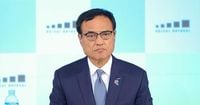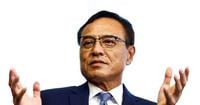On September 2, 2025, Japan’s corporate world was rocked by the abrupt resignation of Takeshi Niinami, the influential chairman and former chief executive of Suntory Holdings. The move came after Japanese police launched an investigation into his purchase of supplements suspected to contain substances illegal under Japan’s stringent drug laws. Niinami, 66, who had only recently been named chairman in March after a decade as CEO, stepped down amid growing scrutiny, leaving one of Japan’s most storied beverage companies facing both uncertainty and public scrutiny.
According to Reuters, Niinami disclosed to Suntory’s leadership on August 22 that he was under police investigation. He maintained that he had purchased the supplements believing them to be legal. In a statement relayed by the company, Niinami expressed regret, saying it was “regrettable” that he could no longer continue as chairman. He told the Asahi newspaper, “I was not aware that it was an illegal supplement. I am innocent.”
The Fukuoka Prefectural Police are at the center of the investigation, reportedly probing whether supplements containing tetrahydrocannabinol (THC)—the psychoactive component of cannabis—had been sent to Niinami’s home. As Tokyo Shimbun reported, the probe is linked to a man arrested in July, though, as of September 2, police had not confirmed any illegal possession or use by Niinami. Suntory executives, when pressed at a hastily convened news conference in Tokyo, declined to specify the supplements, citing the ongoing investigation and the unresolved question of legality.
Japan’s approach to drug enforcement is famously unforgiving. The country maintains some of the world’s strictest drug laws, criminalizing both the use and possession of cannabis and related compounds. Even trace amounts can lead to arrest, prosecution, and, in some cases, prison sentences. This zero-tolerance policy has ensnared prominent individuals before: in 2015, Julie Hamp, an American executive at Toyota, was arrested for importing oxycodone, a painkiller legal in the United States but requiring special permission in Japan. She was never indicted and later returned to work at Toyota. More recently, in 2023, actor Kento Nagayama was sentenced to six months in prison for cannabis possession.
Niinami’s resignation is particularly striking given his stature in Japanese business and public life. A graduate of Keio University and Harvard Business School, he is fluent in English and has long been one of the country’s most visible corporate leaders. He frequently represented Japan at international events, including the World Economic Forum in Davos, and served as an adviser to several Japanese prime ministers. His leadership at Suntory was marked by bold moves, most notably the 2014 acquisition of Beam Inc.—the American company behind Jim Beam, Maker’s Mark, and Knob Creek—for $16 billion including debt. That deal, which Niinami spearheaded shortly after joining Suntory as president, transformed the company into a global powerhouse in the liquor industry, significantly expanding both its revenue and profits.
At the September 2 news conference, Suntory President Nobuhiro Torii, a great-grandson of founder Shinjiro Torii, addressed the media alongside Executive Vice President Kenji Yamada. Both men repeatedly apologized for the situation. Torii stated, “We apologize from the bottom of our hearts for causing trouble over the incident.” He added, “He was a bold, decisive leader who got things done and I truly respected him. In that respect—and I told this to him yesterday as well—it’s a real shame that we couldn’t continue as a team.”
Suntory’s official statements underscored the seriousness with which the company views the matter. The company said that, even though the legality of the supplements had not been determined, “exercising appropriate caution in purchasing supplements is an indispensable quality.” The statement also noted that Niinami’s actions demonstrated “a lack of awareness” that made him “unable to continue in the key position of representative director and chairman.”
While Suntory has moved quickly to manage the fallout—Torii will now fully helm the company—the broader implications remain uncertain. Suntory is not publicly traded, but shares of its listed subsidiary, Suntory Beverage & Food, closed up 3% on the day of the announcement, suggesting limited immediate financial impact. Still, the episode has cast a spotlight on the reputational risks facing Japanese companies and their leaders under the country’s unforgiving drug laws.
The investigation’s focus on cannabis-related compounds highlights a gray area in Japanese law. While THC is strictly prohibited, cannabidiol (CBD)—another compound derived from the cannabis plant—is legal and available in Japan. This distinction can trip up even the most cautious consumer, especially as global attitudes toward cannabis shift and products containing various extracts become more common. Nonetheless, as Reuters noted, Japan’s authorities have shown little inclination to relax enforcement, and the consequences for those found in violation remain severe.
Niinami’s influence extends far beyond Suntory. He is chairman of Keizai Doyukai, the influential Japan Association of Corporate Executives, and serves as a member of an advisory body to Prime Minister Shigeru Ishiba. While Suntory has not commented on whether Niinami will step down from these additional roles, the Asahi newspaper reported that he has no intention of resigning from Keizai Doyukai and is scheduled to hold a press conference on September 3 to explain the circumstances behind his resignation from Suntory. Officials from Keizai Doyukai have not commented publicly on the situation.
Throughout his career, Niinami has been known for his outspoken views on economic and policy issues. He has frequently offered opinions on how Japan’s economy should be managed and on the central bank’s policies. His departure from Suntory marks the end of an era for the company and raises questions about leadership and accountability in Japan’s corporate sector. It also serves as a reminder of the sometimes-unforgiving nature of Japanese public and corporate life, where even unintentional missteps can lead to swift and decisive consequences.
As the investigation continues, Suntory’s leadership is working to reassure stakeholders and the public. The company’s repeated apologies and emphasis on caution reflect a desire to move forward, but the episode will likely remain a reference point for Japanese business for some time. The coming days may bring further clarity, especially as Niinami addresses the media and the investigation unfolds, but for now, Suntory faces the challenge of rebuilding trust while navigating a highly sensitive legal and cultural landscape.
For Japanese corporations and executives alike, the events of September 2025 serve as a stark illustration of the high stakes and delicate boundaries that define leadership in the country’s business world.


